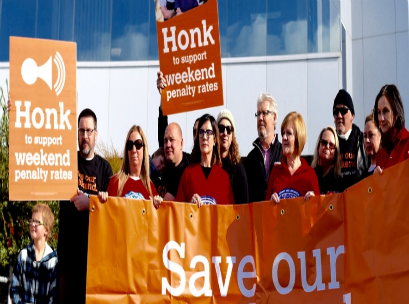The SDA has stepped up its campaign against penalty rate cuts amid a union push to overhaul the Fair Work Commission (FWC).
10-15 per cent cut to Sunday penalty rates came into effect on Sunday following a FWC commission decision last year to reduce rates for employees on the retail and fast-food awards.
It follows a five per cent cut last year for full-time, part-time and casual employees.
The shoppies union slammed the decreases on Monday, saying that approximately 700,000 workers were up to $55 per month worse off.
“In total, these penalty rate cuts will cost retail and fast food workers, many whose employment is insecure and low income, between $2,000 and $6,000 a year,” said SDA national secretary Gerard Dwyer.
Queensland’s industrial relations minister Grace Grace said more than 160,000 Queenslanders would be impacted by this year’s cuts.
“Make no mistake, this is money that will be ripped out of local and regional Queensland economies,” she said.
The FWC’s penalty rate cuts have been applauded by employer groups but have come into political focus in recent months as unions step up efforts to change the nature of industrial relations in Australia.
The Australian Council of Trade Unions has derided the FWC as bias towards employers and has called for broad based change to Australia’s industrial relations system ahead of the 2019 federal election.
There are still two more years of penalty rate cuts on the agenda until rates fall to the levels decided by the FWC in its review last year.
Sunday penalty rates for full-time and part-time workers on the retail award will decrease by a further 15 per cent next year from 180 per cent to 165 per cent, before decreasing again in 2020 to 150 per cent.
Casual workers experienced a 10 per cent cut to 185 per cent on 1 July and will have their rates cut again next year again, bringing the rate to 175 per cent.
Full-time and part time workers on the fast food industry award will see their Sunday penalty rates fall to 125 per cent next year, while casuals will experience another 10 per cent cut to 150 per cent.
Unless you rely on Sunday penalty rates, which are being cut again today – and Mr Turnbull is doing nothing to stop it. https://t.co/GFNiX9LVAn
— Bill Shorten (@billshortenmp) 1 July 2018
“This is a pay cut they cannot afford and do not deserve,” Dwyer said on Monday.
Dwyer said there was no evidence that the penalty rate cuts had created jobs of stimulated the economy.
“Communities want to improve Australia’s economy they need to support policies that put money back into working people’s pockets, not take it out,” he said.
Employer groups are bracing for a fight over penalty rates at the next election, with Labor positioning around a platform that could overturn the FWC’s decision.
Federal Labor recently introduced a private members bill that would have reversed the penalty rate cuts and even nearly secured enough support due to Barnaby Joyce being out of parliament due to his dual citizenship.
Australian Retailers Association executive director Russell Zimmerman said the latest round of cuts would bring further relief to the retail sector, staff and consumers.
But he said he was worried that some had misunderstood recent campaigns by Labor.
“Sunday penalty rates have not been abolished, nor will they be. We have simply reduced the rate from 200% to 150% as these high penalty rates were deterring employers from giving their staff Sunday shifts, and forcing some retailers to close their doors,” Zimmerman said.
The Coalition has maintained support for the cuts.






